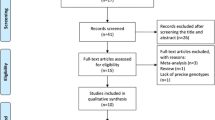Abstract
Previous published studies suggested that genetic polymorphisms in DNA repair genes could modify the DNA repair capacity and could be associated with pancreatic cancer risk. However, previous studies on the association between X-ray repair cross-complementation group 1 (XRCC1) rs25487 (Arg399Gln) polymorphism and pancreatic cancer risk reported inconsistent results. To obtain a more precise estimation of the association between XRCC1 rs25487 polymorphism and pancreatic cancer risk, we performed a meta-analysis of previous published studies by calculating the pooled odds ratio (OR) with a 95 % confidence interval (95 % CI). Eight individual studies with 5,542 subjects from six publications were finally included into this meta-analysis. The meta-analysis of total eight studies showed that there was no association between XRCC1 rs25487 polymorphism and pancreatic cancer risk in total population under all four genetic models (Gln versus Arg: OR = 1.10, 95 % CI 0.95–1.28, P = 0.199; GlnGln versus ArgArg: OR = 1.15, 95 % CI 0.93–1.41, P = 0.191; GlnGln/ArgGln versus ArgArg: OR = 1.10, 95 % CI 0.97–1.25, P = 0.127; GlnGln versus ArgArg/ArgGln: OR = 1.12, 95 % CI 0.92–1.36, P = 0.253). Subgroup analysis showed that there was no association between XRCC1 rs25487 polymorphism and pancreatic cancer risk in Caucasians, but XRCC1 rs25487 polymorphism was associated with pancreatic cancer risk in Asians (GlnGln/ArgGln versus ArgArg: OR = 1.24, 95 % CI 1.01–1.53, P = 0.040). Therefore, the meta-analysis suggests that XRCC1 rs25487 polymorphism is associated with pancreatic cancer risk in Asians. Further studies with more participants are needed to provide a more precise estimation on the association above.


Similar content being viewed by others
References
Li D, Xie K, Wolff R, Abbruzzese JL. Pancreatic cancer. Lancet. 2004;363:1049–57.
Heinemann V, Haas M, Boeck S. Systemic treatment of advanced pancreatic cancer. Cancer Treat Rev. 2012;38:843–53.
Hansel DE, Kern SE, Hruban RH. Molecular pathogenesis of pancreatic cancer. Annu Rev Genomics Hum Genet. 2003;4:237–56.
Vaccaro V, Gelibter A, Bria E, Iapicca P, Cappello P, Di Modugno F, et al. Molecular and genetic bases of pancreatic cancer. Curr Drug Targets. 2012;13:731–43.
Aune D et al. Body mass index, abdominal fatness and pancreatic cancer risk: a systematic review and non-linear dose–response meta-analysis of prospective studies. Ann Oncol. 2012;23:843–52.
Bracci PM. Obesity and pancreatic cancer: overview of epidemiologic evidence and biologic mechanisms. Mol Carcinog. 2012;51:53–63.
Yang F, Jin C, Subedi S, Lee CL, Wang Q, Jiang Y, et al. Emerging inorganic nanomaterials for pancreatic cancer diagnosis and treatment. Cancer Treat Rev. 2012;38:566–79.
Almeida KH, Sobol RW. A unified view of base excision repair: lesion-dependent protein complexes regulated by post-translational modification. DNA Repair (Amst). 2007;6:695–711.
Ginsberg G, Angle K, Guyton K, Sonawane B. Polymorphism in the DNA repair enzyme XRCC1: utility of current database and implications for human health risk assessment. Mutat Res. 2011;727:1–15.
Tudek B. Base excision repair modulation as a risk factor for human cancers. Mol Aspects Med. 2007;28:258–75.
Horton JK, Watson M, Stefanick DF, Shaughnessy DT, Taylor JA, Wilson SH. XRCC1 and DNA polymerase beta in cellular protection against cytotoxic DNA single-strand breaks. Cell Res. 2008;18:48–63.
Duell EJ, Holly EA, Bracci PM, Wiencke JK, Kelsey KT. A population-based study of the Arg399Gln polymorphism in X-ray repair cross-complementing group 1 (XRCC1) and risk of pancreatic adenocarcinoma. Cancer Res. 2002;62:4630–6.
Jiao L, Bondy ML, Hassan MM, Wolff RA, Evans DB, Abbruzzese JL, et al. Selected polymorphisms of DNA repair genes and risk of pancreatic cancer. Cancer Detect Prev. 2006;30:284–91.
Wang L, Lin DX, Lu XH, Miao XP, Li H. [Polymorphisms of the DNA repair genes XRCC1 and XPC: relationship to pancreatic cancer risk]. Wei Sheng Yan Jiu. 2006;35:534–6.
McWilliams RR, Bamlet WR, Cunningham JM, Goode EL, de Andrade M, Boardman LA, et al. Polymorphisms in DNA repair genes, smoking, and pancreatic adenocarcinoma risk. Cancer Res. 2008;68:4928–35.
Nakao M, Hosono S, Ito H, Watanabe M, Mizuno N, Sato S, et al. Selected polymorphisms of base excision repair genes and pancreatic cancer risk in Japanese. J Epidemiol. 2012;22:477–83.
Yan D, Wang X, Li H, Xu X, Zhu G, He T. Relationship between single nucleotide polymorphism of X-ray repair cross complementing group 1 gene associated with smoking and susceptibility to pancreatic cancer. Chin J Exp Surg. 2012;29:2300–3.
Cochran WG. The combination of estimates from different experiments. Biometrics. 1954;10:101–29.
DerSimonian R, Laird N. Meta-analysis in clinical trials. Control Clin Trials. 1986;7:177–88.
Mantel N, Haenszel W. Statistical aspects of the analysis of data from retrospective studies of disease. J Natl Cancer Inst. 1959;22:719–48.
Mazaki T, Masuda H, Takayama T. Polymorphisms and pancreatic cancer risk: a meta-analysis. Eur J Cancer Prev. 2011;20:169–83.
Fan Y, Zhang W, Shi CY, Cai DF. Associations of GSTM1 and GSTT1 polymorphisms with pancreatic cancer risk: evidence from a meta-analysis. Tumour Biol. 2013;34:705–12.
Conflicts of interest
None
Author information
Authors and Affiliations
Corresponding author
Rights and permissions
About this article
Cite this article
Jiang, H., Wu, D., Ma, D. et al. Association between X-ray repair cross-complementation group 1 rs25487 polymorphism and pancreatic cancer risk. Tumor Biol. 34, 3417–3421 (2013). https://doi.org/10.1007/s13277-013-0914-9
Received:
Accepted:
Published:
Issue Date:
DOI: https://doi.org/10.1007/s13277-013-0914-9




